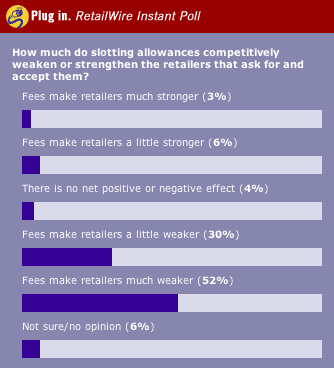By
George Anderson, Editor-in-Chief, RetailWire
A
recent article in The Financial Times,
America's Time-Warp Supermarkets,
has a number of critical observations to
make of the U.S. grocery business. Among
the most biting is the author's contention
that slotting fees and other monies have
led to a sense of sameness across stores
with the same items prominently featured
on end-caps for, yawn, purchase.
While
being able to command a price for shelf-space
gives the impression that retailers hold
the cards, the article suggests that retailers
in the U.S. are weaker as a result of the
practice.Neil Currie, an analyst at UBS,
compared slotting fees to a drug that some
chains are addicted to.Thierry Chassaing,
a senior partner at the Boston Consulting
Group, said, "U.S. supermarket chains
have a tenth of the power of those in Europe.
A Giant or a Star Market in Boston can do
little against food companies."
The
strongest of chains in the U.S. are those
that do not rely on manufacturer funds,
according to the article's author, John
Gapper. "It is only since national
chains such as Whole Foods and Wal-Mart
emerged, with the purchasing and marketing
clout to stand up to suppliers, or circumvent
them altogether, that supermarkets have
sharpened up their act," he wrote.
Discussion Question for the BrainTrust
panel: Do
you agree that slotting allowances are causing
a general 'sameness' on supermarket shelves?
Have the last 5 years seen any significant
changes in the way most U.S. grocers decide
what goes on their shelves?
RetailWire
Instant Poll Results:

RetailWire BrainTrust Comments:
Stiff
slotting allowances are economically feasible
in the business models of the same usual
suspects, the brands that "everyone
else" carries. The industry has inadvertently
shut out the most innovative new ideas,
most exciting new brands, and most appealing
niches, in favor of the boring defensive
approach of making sure it earns its small
profit from "buying" rather than
"selling." The largest branded
companies that can afford the slotting allowances
tend to be the least innovative and those
are the brands that dominate the shelves
in every "sameness" retail chain
with the same assortment. And so what is
the result? The only differences between
one chain to the next is what items are
being discounted, who has the deepest TPR,
and who is doubling coupons, etc. Big yawn!
- David
Biernbaum, Senior Marketing and Business
Development Consultant, David Biernbaum
Associates
|
BWH Consulting President Bill Bittner
Says : |
 If
we really want to increase the number
of manufacturers, we have to choose
a new way to handle risk. If
we really want to increase the number
of manufacturers, we have to choose
a new way to handle risk.
What do you
say? Send
us your comments here |
I
agree [slotting fees] distort the market
and lead to large manufacturers dominating
the supplier channels. Innovative small
companies don’t have the cash to finance
the purchase of shelf space in the supermarket.
This does not mean assortment must suffer
but it does mean the number of manufacturers
must decline. The remaining manufacturers
increase their revenue by offering new varieties
either at new price points as additional
brands or with new products in existing
brands. If we really want to increase the
number of manufacturers, we have to choose
a new way to handle risk.
Slotting
allowances made sense in the beginning because
they offered the retailer protection against
product failures. Rather than get stuck
with a new product that did not sell, the
retailer could justify experimenting with
new products by the “insurance”
that the slotting fee provided. Maybe there
is an opportunity here for a third party
to take on the risk of a new product offering.
Just like other businesses offload risk
onto third parties willing to take the chance,
suppliers and retailers could use “New
Product Insurance” to syndicate the
risks associated with taking on a new product.
Innovative startups could offer their products
without a large upfront cost and risk adverse
retailers could recover the cost of failed
products. This would remove the distorting
effect of upfront payments and help both
sides provide greater assortment.
- Bill
Bittner, President, BWH Consulting
SAs are like
a drug, a habit that's hard to kick particularly
when you are weak in other areas. The short
term cash flow benefits of these allowances
propped up more than a few players five
years ago, but the result is inefficient
assortment variety levels, and unproductive
space allocation. Hard to look back and
say it wasn't the right thing though, since
the bulk of the merchandising talent seemed
to lay on the supply side for years. Seems
this dynamic has changed, and grocers are
growing more confident, and independent,
which should lead to much better grocery
experiences for all of us.
- Todd
Belveal, Vice President, Strategy &
Research, Design Forum
Read
the entire story and RetailWire discussion
at:
http://www.retailwire.com/Discussions/Sngl_Discussion.cfm/12241
Get
Plugged in with RetailWire.
Membership
in RetailWire.com
is free to all retail and related industry
professionals. Simply go to www.retailwire.com
and click the FREE REGISTRATION button.
|